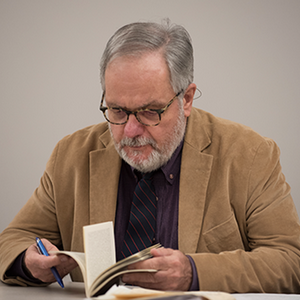Mentorship
Most unique to the Lyceum Scholars Program is the moral, professional and intellectual mentorship it provides. This mentorship includes the following:
Socratic Tutor Sessions
We believe there is a connection between moral character and a free society. Socratic Tutor sessions allow Lyceum Scholars to meet bi-weekly with Lyceum faculty to discuss moral character and the ways in which the ideas from the classroom connect to everyday life. Many Scholars consider their Socratic Tutor Sessions to be the highlight of their experience at Clemson University.
“The Lyceum Scholars Program is wonderful because it enables the particular Lyceum Scholar to consult closely with a Socratic Tutor in a personal, informal setting, where the student can talk to the Socratic Tutor about anything and everything, which necessarily must imply what they’re going through as an undergraduate student in the 21st century. So, for example, say a student came to my office today and said that he was feeling a little bit blue. 'Sometimes I get a little bit down, and there are a lot of things I have to do,' and so on. We can move on from that starting point. Somehow, the kind of education in the Lyceum Scholars Program is meant to relate to that and to be of help. So it wouldn't be in any way unusual for a Socratic Tutor to say to a student, 'Well, maybe if you have an hour tonight, you should read about the mental crisis John Stuart Mill describes in his autobiography, and why he went down in the dumps at exactly your age. That might be very informative to you in the sense that you see how a very great mind worked its way back to functionality. And, secondly, you can see that you're not alone in this world. If someone like John Stuart Mill has to deal with these kinds of challenges, then you don't need to feel worried that you have to too. It’s in fact a badge of honor.'”
Colin Pearce, Ph.D.Retired Lyceum Professor
Professional Development

Our faculty and staff want our Lyceum Scholars to succeed not only at Clemson University but also in their personal and professional lives after graduation. Therefore, we work to place students in summer programs that allow them to gain experience in their fields of interest and continue their studies outside of the classroom. Scholars work individually with Lyceum faculty to determine what opportunities fit their interests and aspirations, compose their application materials, and participate in practice interviews. Our faculty write excellent letters of recommendation because of the close faculty-student relationships fostered by the Lyceum Scholars Program.
In the past, our Scholars have gone on to pursue various graduate degrees at universities such as Harvard University, the University of Chicago, and the University of Oxford. Other Scholars have attended summer academic programs at distinguished institutions in and around the D.C. area.
Learn more about professional development in the Lyceum Scholars Program.
Lyceum Thesis
The Lyceum Thesis allows Lyceum Scholars to produce a serious work of scholarship as the capstone of their undergraduate career. Interested students work with a faculty advisor to propose and answer a research question over one or two semesters. They are then invited to present their work to other students and faculty through our Lyceum Student Speakers Series.


